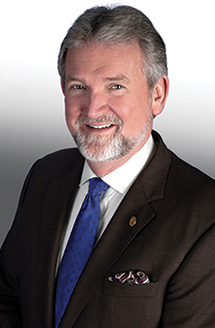Gene N. Herbek, MD
March 2014—Implementation of meaningful use and related federal regulations has spurred widespread adoption of the electronic health record, and that’s a game-changer. Every one of us will need to have competence in clinical informatics, to varying degrees.
Most CAP membership benefits appeal to my practical side by providing access to unique tools, useful knowledge, and pathologists who are glad to share what they know. When someone puts “CAP benefits” and “practical” in the same sentence, I think first of laboratory improvement, education/professional development, and advocacy/policy. Pathology informatics is a discipline that is vital to our interests in all three spheres. It also includes skill sets that pathologists need.

Gene N. Herbek, MD
Walter Henricks, MD, vice chair of the CAP Diagnostic Intelligence and Health Information Technology, or DIHIT, Committee, sees clinical informatics as a means of pathologist empowerment. The EHR is going to be the way health care providers will interact with laboratory information, he says, for both test orders and results. Pathologists are the physicians who best understand, anticipate, and communicate EHR-related laboratory information management issues that affect patient care and safety.
The CAP Board of Governors has approved a comprehensive clinical informatics strategy developed over the past two years by a cross-section of members and staff who devoted countless hours. Dr. Henricks and Andrew Horvath, MD, who was then on the CAP Transformation Program Office Steering Committee, were the member leads. Greg Gleason, CAP chief information officer, was staff executive sponsor. The DIHIT Committee, chaired by Raj Dash, MD, and staffed by Mary Kennedy, CT(ASCP), MPH, will coordinate the implementation.
We are putting a lot of energy into identifying the best ways to use clinical informatics to support improvements in CAP laboratory accreditation and other laboratory improvement processes. At the same time, widespread adoption of clinical informatics tools by practicing pathologists calls for a robust menu of the best educational options for our members, effective advocacy with policymakers and regulators, and collaboration with other organizations in developing standards and best practices. For example, Dr. Henricks and Liron Pantanowitz, MD, are co-chairing a working group with representation from the CAP, the Association of Pathology Chairs’ Program Directors Section, and the Association for Pathology Informatics that is framing an approach to improving residency training in pathology informatics. And a group headed by Bruce Beckwith, MD, created a white paper, “Laboratory Interoperability Best Practices: Ten Mistakes to Avoid” (at http://tinyurl.com/labinterop), that offers straightforward insights of the sort that come only from firsthand experience.
As Dr. Horvath says, clinical informatics tools will enable pathologists to transfer the data they generate into the knowledge physicians need to treat their patients. And, he reminds us, we’re all navigating the same shifts in the regulatory, educational, and organizational arenas. This is not about size or type of practice.
I’m told that many people think clinical informatics is something that computer specialists do. Let’s dispel that notion. Clinical informatics is not about computer programming. It is integral to the modern practice of pathology. We should think of clinical informatics as Drs. Horvath and Henricks have defined it: the application of information management in health care to promote safe, efficient, effective, personalized, and responsive care, and a discipline that benefits individuals, institutions, populations, and communities. We can also do well to recognize that dealing with laboratory information management issues stemming from the EHR is now part of operating a laboratory.
David Booker, MD, who chairs the CAP Clinical Informatics Steering Committee, has been known to say that for most of us, clinical informatics engagement will be about the answers to three questions: What tools are available? Which tools should we use? How should we use them? We’re talking about what we have always done—accessing and applying the information we already have in a meaningful way. We need to capture this discipline for the same reasons we need to be the go-to experts in immunohistochemistry.
While all of us should be pursuing clinical informatics education, some of us should be pursuing more sophisticated clinical informatics education. The CAP intends to provide and guide its members to sources of both through courses at the annual meeting and online and through webinars. And peer networking is critical, so make sure someone in your practice gets to the CAP annual meeting, participates in groups that focus on pathology informatics, and attends at least a few such events where we learn over lunch. We’re all busy; think of it as brain food.
I have mentioned only a handful of the many outstanding pathologists who have put their shoulders to the task of pushing our specialty forward in clinical informatics. We owe them a great debt. Years ago, it was Louis Wright, MD (who’s been known to declare, “You can’t execute a model for personalized health care without robust informatics”) who envisioned the organizational piece and persuaded us to create the DIHIT and Personalized Health Care committees. We are in a good position on this now, but we wouldn’t be without pathologists like him—and, of course, William Dito, MD, who was pushing this stuff long before most of us knew what he was talking about.
I think of Dr. Dito—along with Bruce Friedman, MD, who organized 30 years ago what has evolved into today’s Pathology Informatics Summit—as the founders of pathology informatics. When Dr. Dito died in 2006, the CAP Foundation established the William R. Dito Fund for Informatics so that if he couldn’t be with us, he could still keep us thinking. Contributions can be made to the fund via the CAP Foundation page (foundation.cap.org); there’s a check-off in the drop-down box. The Dito Fund supports resident travel awards for pathology trainees who focus their learning at the CAP annual meeting around the many excellent informatics offerings. He would have liked that.
[hr]Dr. Herbek welcomes communication from CAP members. Write to him at president@cap.org.
 CAP TODAY Pathology/Laboratory Medicine/Laboratory Management
CAP TODAY Pathology/Laboratory Medicine/Laboratory Management
